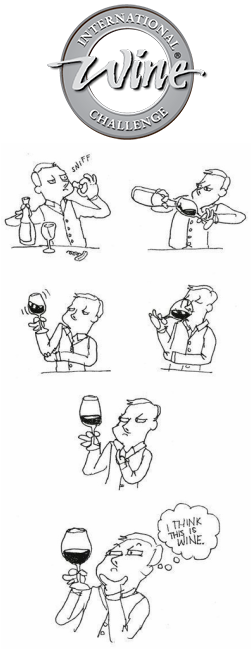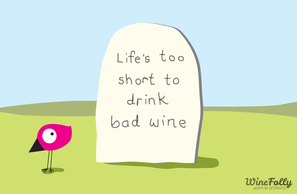
It might seem like a dream to taste wine all day, starting at 930am with Champagne tasting. However, as one of my co-judges said, with Champagnes like these, it's no wonder that Prosecco sales are booming. And he should know, as a former supermarket wine supremo...
It's fairly exhausting, being on your feet all day, thinking critically, and of course, spitting out all the wines you sample without getting covered in wine spray. Lots of good-natured discussion ensures fair results for all the wines, and a great sharing of knowledge. It was a real honour to taste alongside such gurus of wine and I learned a lot from the Master of Wine at the head of my tasting panel and the rest of the team.
But what does the International Wine Challenge mean for you, the tasting public. Can you really trust the "award winning" claims of the wines on offer at your local merchant, off-license or supermarket?
In a word, yes. And in more depth, yes, particularly if it's an IWC medal.
In the UK, there are several "big" wine awards you'll find mentioned on wine labels. IWC has been running for 30 years and is perhaps the most thorough. There's also the Decanter World Wine Awards, which claims to be the largest, and the International Wine and Spirits Competition, which conducts a chemical analysis of each wine as well as a blind tasting.
One of the major advantages with the IWC, is that all wines are tasted by at least 2 panels prior to being awarded a medal. Fortunately I was judging in week 2 & the bulk of the "not recommended" submissions had been weeded out. It's serious work.
When a wine is deemed as "out" in week one, it will be re-tasted by one of the Chairmen. If they disagree, the wines will be re-submitted for tasting in week 2. Sometimes even wines with a clear "out" are re-judged in week 2 just in case of a bad bottle. There is also clear "fault" checking and extra bottles are on hand via the helpful and hard-working crew to ensure that every wine is given a fair chance. In fact, the ability of the expert judges to pick out wine faults is hugely impressive. They really want to give every wine it's best opportunity to shine, and I'm sure many consumers wouldn't have noticed several of the faults we encountered in our panel.
Of course there are great wines out there with no medal. Not every winemaker submits their wines, perhaps because they have no trouble selling them, or perhaps they missed a deadline, or perhaps, even though their wine achieves a bronze medal, they decide not to publicise it because they were hoping for higher scores.

Next, our panel (again, including 4-5 tasters) analytically taste. First tasting individually and making notes as we go, at the end of each flight there's discussion to agree on whether the wines sampled should get a commendation, bronze, silver or gold medal award. Several wines are still deemed "out" at this stage and don't receive an award. The agreed recommendations are then sent to the Judging Chairs for the final decision, along with an agreed "tasting note" which describes the wine and is published along with the final results, to help you, the public make wise wine choices.
Finally, in week 3, all the gold medal winning wines are reviewed by senior judges so that the "trophy winning" wines can be declared. These rare top ratings aren't given if no wine is deemed up to scratch.
Of the 64 wines my panel tasted, 2 were possible gold medalists, meaning they were classic and near perfect expressions of their type.
I loved them both, but my judgement wasn't enough to see them through. In fact, generally, I scored most wines lower than the rest of my panel, slightly afraid of being too generous. (So if I tell you a wine is gorgeous, you can be sure it's good.)
The likes of Tim Atkin & Oz Clark were on hand as final arbiters for the top awards.
The potential gold winning wines may not be your every day wines, being rather specialist: manzanilla sherry and sweet German Riesling. These 2 wines are at extreme opposites stylistically, and both under-rated by the supermarket wine drinking public. I hope if you're reading this you'd be open to trying these wines some day. But of course, I can't tell you what they were. I can't find out until myself the final results are confirmed and announced.
The final medal winners from the judging I took part in (Tranche 2 of the International Wine Challenge 2014) will be announced online on 7th May in the same place as the 2013 results. Many thousands of wines will have been submitted and tasted. Only wines that are genuinely good examples of their type will achieve awards.
If you're a big fan of a particular style of wine, you can search for medal winners by grape variety, by country or region here. Good luck tracking down your favourites.
I'd love to hear if you've bought any wine because of it's "medal" status. And if so, whether the wine lived up to it's award-winning expectations. Why not share a photo of your favourite award winner on our Facebook page?
Cheers!


 RSS Feed
RSS Feed
